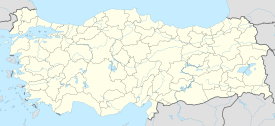Abydos, Hellespont
| Ἄβῡδος | |

Abydos and the Hellespont
|
|
| Location | Çanakkale, Çanakkale Province, Turkey |
|---|---|
| Region | Troad |
| Coordinates | 40°11′43″N 26°24′18″E / 40.19528°N 26.40500°ECoordinates: 40°11′43″N 26°24′18″E / 40.19528°N 26.40500°E |
| Type | Settlement |
Abydos (Ancient Greek: Ἄβῡδος) or Abydus, an ancient city at Troad (Troas), in Asia Minor was located on the western slope of the promontory south of Nağara Point, and is sited on the best harbor on the Asiatic shore of the Hellespont. The acropolis of Abydos stood on the hill of Mal Tepe. Sestus lies north across from Abydos, on the European side of one of the narrowest points of the Dardanelles, slightly more than a nautical mile (1.9 km; 1.2 mi) broad; the narrowest point is at Çanakkale. The site is enclosed in a military zone considered to be of strategic importance, and access to it throughout the 20th century was generally prohibited.
Abydos was first mentioned in the catalogue of Trojan allies.Strabo, noting that earlier the area was Thracian, states that the city itself was founded by Milesian colonists with the consent of Gyges, king of Lydia, around 700 BC. It was occupied by the Persians in 514 BC, and Darius the Great burnt it in 512 BC. Here Xerxes built two pontoon bridges and crossed the strait in 480 BC, when he invaded Greece. It later was a member of the Delian League.
Abydos is celebrated for the vigorous resistance it made against Philip V of Macedon in 200 BC. In literature, it is famous for the mythical home of Leander. Lord Byron memorably adopted its name in his The Bride of Abydos. It minted coins from the early 5th century BC to the mid-3rd century AD.
The town remained until late Byzantine times as an important toll and customs station of the Hellespont, its importance thereafter being transferred to the Dardanelles, after the building of the "Old Castles" by Sultan Mehmet II (c. 1456).
...
Wikipedia

